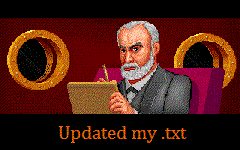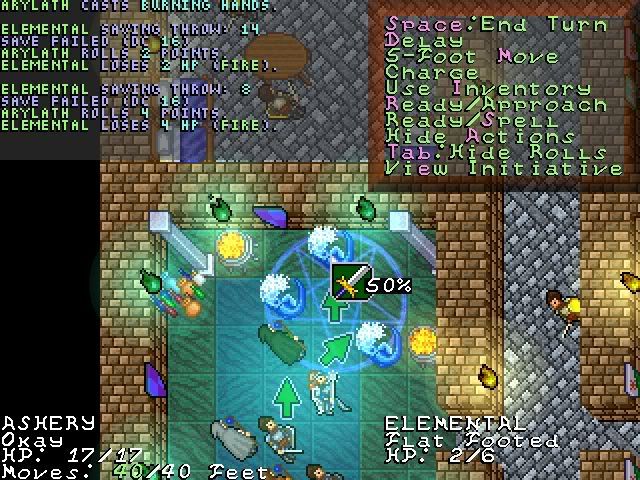Tags: Lords of Xulima; Numantian Games
Last week, the isometric-meets-first person RPG Lords of Xulima got released on Steam Early Access. For this preview, I am joined by the esteemed community member felipepepe and we just talk and talk and talk about what the game currently has to offer. (We could've talked even more, but you have to stop somewhere.) Short version: we enjoyed it. Have a few snippets:
Read the full article: RPG Codex Preview: Lords of Xulima
Last week, the isometric-meets-first person RPG Lords of Xulima got released on Steam Early Access. For this preview, I am joined by the esteemed community member felipepepe and we just talk and talk and talk about what the game currently has to offer. (We could've talked even more, but you have to stop somewhere.) Short version: we enjoyed it. Have a few snippets:
F: I’d say it took me about half an hour to go from disappointed to excited. As I invested myself and understood the logic behind each mechanic, I was impressed. I can’t sum Xulima up in just a few words. The exploration is similar to Geneforge, but much tighter and with Zelda-like elements, while combat is that of blobbers, with an added layer of formations and positioning. All surrounded by robust resource management. I can recognize the individual mechanics, but they are put together in a brand new way. The small Spanish team behind Xulima clearly played a lot of RPGs and carefully examined the mechanics behind each game, what worked, what could be different, and what they could offer. Xulima is the result of that, a careful collection of mechanics and gameplay elements. It feels familiar, but for every aspect of it, there’s a interesting twist.
Using a musical metaphor, Xulima isn’t a cheap "Best of RPGs" CDs done by a mediocre cover band. It’s one of those albums where a good musician makes readings of his favorite songs in a new, amusing coating. [...]
CB: It feels like every corner of the world has at least something interesting to it, something that makes it worth exploring and clearing out that fog of war. The only thing I kept wishing for was edge scrolling for the camera – sometimes you just want to have a good overview of the surrounding area, which the zoomed-out map can’t really give you. You can also explore in any direction, or venture into any dungeon, as long as you’ve found the key and/or can defeat the encounters in your way. I wouldn’t call the game fully "open world," since – similarly to Divinity: Original Sin, to use a recent comparison – enemies that are significantly higher-level can be essentially undefeatable, but it does give you enough freedom and sometimes even alternative paths to reach the same objective.
F: I also like that dungeons have a unique feel. Some are just combat areas, others a clever mix of traps, enemies and hazards, and some just one big elaborate puzzle. They aren’t very long, but usually entertaining. Inside, you’ll often spot traps (as long as your Perception skill is high enough). Some of them appear as red areas that can be disarmed, similarly to Baldur’s Gate. But there are also spikes, which should be carefully navigated around (you can even use the keyboard for more precise navigation), or hazards, such as a room on fire, webs full of spiders, or venomous gas, that you can either endure or neutralize by using expensive magic scrolls. [...]
F: Every action you perform, from simply walking to forcing doors open to resting, consumes food. Run out of food and you'll suffer a massive debuff, or even die of starvation on the Hardcore difficulty setting. And man, is food expensive. In fact, everything is expensive, especially healing your characters of status effects. In the early game, lifting the curse from two or more characters can mean selling a piece of gear to pay for the bills. [...] There are also various other ways to find yourself broke, as beside food you need torches, lockpicks, magic scrolls, and so on, and those blasted peasants keep raising their prices as you level up! (Not the most elegant of game mechanics, but it works well enough.) Not to mention the thieves roaming the roads, who will steal a fortune and run away unless you kill them quickly, or a vast desert requiring huge amounts of food to be crossed. I honestly don’t remember ever playing anything like this before, even 30 hours in I was still counting coins and thinking about the cheapest way to do stuff. [...]
CB: I had to stop playing the game after the second temple just so we could discuss it and do this preview, but I am really looking forward to what the rest of the game has to offer.
F: I’m happy to inform you that after the second temple things get even more diverse, and exploration opens up a lot. I could access three other temples at once, deciding which to face first. There were huge deserts, burning gardens, and some other nice surprises. Surprises that I hadn’t thought the game would be able to deliver.
This all goes back to what I think is Xulima’s main issue: the presentation constantly makes you think less of the game. A lot less.
Using a musical metaphor, Xulima isn’t a cheap "Best of RPGs" CDs done by a mediocre cover band. It’s one of those albums where a good musician makes readings of his favorite songs in a new, amusing coating. [...]
CB: It feels like every corner of the world has at least something interesting to it, something that makes it worth exploring and clearing out that fog of war. The only thing I kept wishing for was edge scrolling for the camera – sometimes you just want to have a good overview of the surrounding area, which the zoomed-out map can’t really give you. You can also explore in any direction, or venture into any dungeon, as long as you’ve found the key and/or can defeat the encounters in your way. I wouldn’t call the game fully "open world," since – similarly to Divinity: Original Sin, to use a recent comparison – enemies that are significantly higher-level can be essentially undefeatable, but it does give you enough freedom and sometimes even alternative paths to reach the same objective.
F: I also like that dungeons have a unique feel. Some are just combat areas, others a clever mix of traps, enemies and hazards, and some just one big elaborate puzzle. They aren’t very long, but usually entertaining. Inside, you’ll often spot traps (as long as your Perception skill is high enough). Some of them appear as red areas that can be disarmed, similarly to Baldur’s Gate. But there are also spikes, which should be carefully navigated around (you can even use the keyboard for more precise navigation), or hazards, such as a room on fire, webs full of spiders, or venomous gas, that you can either endure or neutralize by using expensive magic scrolls. [...]
F: Every action you perform, from simply walking to forcing doors open to resting, consumes food. Run out of food and you'll suffer a massive debuff, or even die of starvation on the Hardcore difficulty setting. And man, is food expensive. In fact, everything is expensive, especially healing your characters of status effects. In the early game, lifting the curse from two or more characters can mean selling a piece of gear to pay for the bills. [...] There are also various other ways to find yourself broke, as beside food you need torches, lockpicks, magic scrolls, and so on, and those blasted peasants keep raising their prices as you level up! (Not the most elegant of game mechanics, but it works well enough.) Not to mention the thieves roaming the roads, who will steal a fortune and run away unless you kill them quickly, or a vast desert requiring huge amounts of food to be crossed. I honestly don’t remember ever playing anything like this before, even 30 hours in I was still counting coins and thinking about the cheapest way to do stuff. [...]
CB: I had to stop playing the game after the second temple just so we could discuss it and do this preview, but I am really looking forward to what the rest of the game has to offer.
F: I’m happy to inform you that after the second temple things get even more diverse, and exploration opens up a lot. I could access three other temples at once, deciding which to face first. There were huge deserts, burning gardens, and some other nice surprises. Surprises that I hadn’t thought the game would be able to deliver.
This all goes back to what I think is Xulima’s main issue: the presentation constantly makes you think less of the game. A lot less.
Read the full article: RPG Codex Preview: Lords of Xulima







![Have Many Potato [2013] Codex 2013](/forums/smiles/campaign_tags/campaign_potato2013.png)
![The Year of Incline [2014] Codex 2014](/forums/smiles/campaign_tags/campaign_incline2014.png)




















![Glory to Codexia! [2012] Codex 2012](/forums/smiles/campaign_tags/campaign_slushfund2012.png)

















